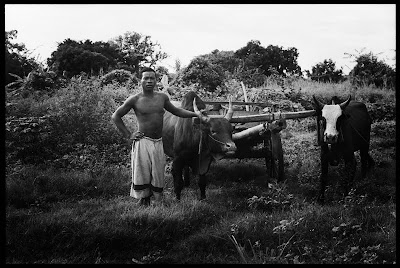
We continued onwards with the onset of the setting sun, south to Morondava. We arrived as the light was dimming. Unlike the typically large cityscapes that are surrounded by tall cement forests of buildings, the light in Morondava seemed to linger on the low horizon. Upon arrival at our temporary dwelling at Le Trecigogne, my immediate impulse was to take a real shower. I wanted desperately to soothe the burning of my skin and remove the remnants of the dusty red earth and sweat from my pores.
Shortly after enjoying a large Langoustine feast, I was presented with a chocolate cake. It was a no bake frozen chocolate cake: lady fingers, a touch of rum, and cacao powder, that was pureed and frozen. There was a running joke between my Canuck friends and our pirate. Since arriving I had been searching for the elusive Madagascar chocolate, but sadly my quest was not a fruitful one. As I found out later Madagascar cacao is a highly valued exported commodity, but not very accessible within Madagascar as one might think. I took the simple pleasure; my cake sent me giddy into the night. We walked back parallel to Nosy Kely beach towards the hotel. It was a beautiful night, with a canopy of stars unlike what I am used to. With the Milky Way stretching far and wide across the sky, I felt as though I could reach out and actually grasp for the shooting stars.
We had not intended to stay the entire day in Morondava, but the extreme overload to our senses was enough to take a day and night of rest. I awoke late and departed even later, slowly sauntering through the ridiculous heat. I walked along Nosy Kely in search of a working internet connection and then further past into town. It was at this moment that my sunburn went from a minor aliment to a major turbulence. By the time I was midway through the market, my shoulders, despite the repeated applications of sunscreen, were lobster red and painful to the touch. I walked the narrowing streets trying to find a mobile phone and some film. Like most tropical countries though, by the time I reached the Orange boutique, it was closed for siesta. I hunted for shade or anything that would cover my searing skin a bit. I proceeded rapidly trying to find my way back from where I came. My lucky strike was finding 10 rolls of colour film on route. I worried, with so much road ahead, the diminished film count was going to become a problem. Back at the hotel, I slummed like worn ocean driftwood under the roof of the hotel’s café, trying to moderate my disposition. It was several hours and a shower later, before I was able to pick myself up and muster the motivation for a swim in the ocean.






